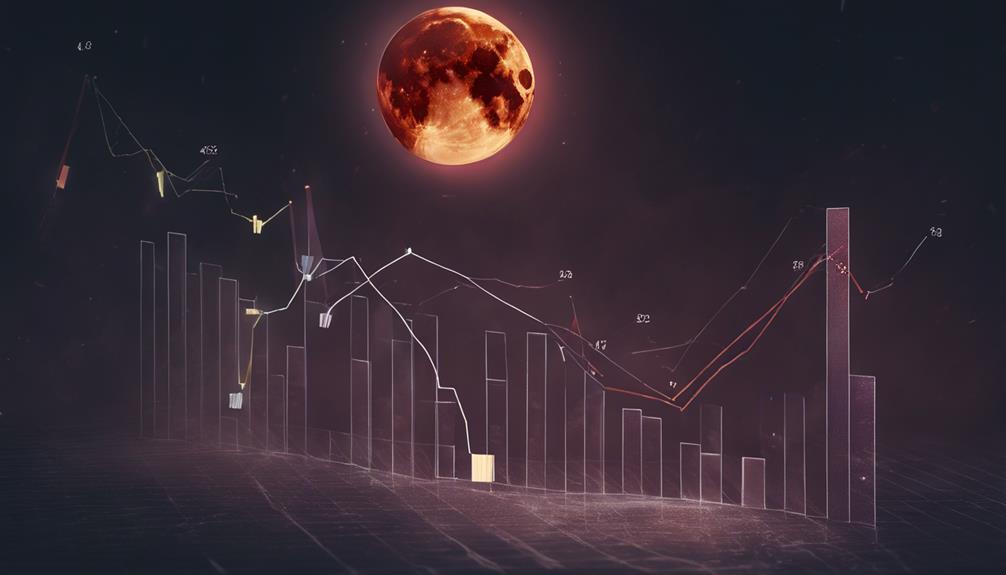How Lunar Eclipses Impact Financial Markets and Investor Sentiment

Lunar eclipses have long been associated with various superstitions and beliefs. Some people believe that lunar eclipses can have an impact on human behavior and emotions, which in turn can affect financial markets. While there is no scientific evidence to support this claim, some investors may still be influenced by such beliefs. It is essential for investors to rely on data and analysis rather than superstitions when making financial decisions.
Investor sentiment plays a crucial role in financial markets. If a large number of investors believe that lunar eclipses will have a negative impact on the market, they may start selling their assets, leading to a drop in prices. This behavior can create a self-fulfilling prophecy where the belief in a market downturn causes the downturn itself. As such, it is essential for investors to remain rational and informed, focusing on economic indicators and market trends rather than astrological events.
Historical Overview of Lunar Eclipses
Throughout history, lunar eclipses have captivated humanity with their celestial dance of shadow and light. These awe-inspiring celestial events have left a profound mark on our financial history, often coinciding with significant shifts in economic fortunes. From ancient civilizations who believed eclipses foretold the rise and fall of kingdoms to modern-day investors who analyze market trends during these periods, the connection between lunar eclipses and financial markets has been a subject of intrigue.
As the moon slips into Earth's shadow, casting an ephemeral glow of red, the world below isn't immune to its influence. In financial history, lunar eclipses have been linked to moments of great change, both in economies and in individual mindsets. The ebb and flow of the stock market seem to echo the celestial rhythm above, reacting to the mysterious forces at play during these cosmic events.
Theories Linking Eclipses to Markets
In the realm of financial markets, various theories have been proposed to elucidate the potential correlations between lunar eclipses and market movements. Some believe that astrological connections between celestial events and human behavior extend to economic patterns. While skeptics may scoff at such ideas, there is a certain allure to the concept of cosmic forces influencing our earthly endeavors.
| Theories | Link to Markets |
|---|---|
| Astrological beliefs | Market sentiment shifts |
| Lunar cycles | Investment fluctuations |
| Psychological impact | Stock market volatility |
Astrological connections suggest that the alignment of celestial bodies during eclipses can sway investor sentiment, leading to market fluctuations. Lunar cycles, with their rhythmic patterns, are thought to coincide with changes in investment behavior. The psychological impact of witnessing a celestial event like an eclipse may trigger moments of uncertainty, potentially contributing to increased stock market volatility. Whether you believe in these theories or not, exploring the mystical ties between the cosmos and economic trends can be a fascinating journey into the unknown.
Case Studies and Data Analysis

Engage in the meticulous scrutiny of real-world scenarios and statistical examinations to unearth the intricate relationship between lunar eclipses and financial markets in the realm of Market volatility analysis and Lunar cycle correlation. By delving into historical data and conducting precise market volatility analysis during lunar eclipses, patterns may emerge, shedding light on potential correlations that influence investor behavior. Through the lens of case studies and data analysis, one can decipher how lunar eclipse patterns coincide with fluctuations in market activity.
The examination of investor behavior during lunar eclipses offers a unique perspective on how emotions and decision-making processes are impacted. Market volatility analysis provides a quantitative framework to comprehend the nuances of these lunar cycle correlations. As you navigate through the data, observe how market trends align with lunar phases, offering a glimpse into the intricate dance between celestial events and financial dynamics. By exploring these case studies and delving into data analysis, you embark on a journey to uncover the hidden connections between lunar phenomena and market behavior.
Psychological Impact on Investors
Delve into the intricate realm of investor psychology, where emotions intertwine with market dynamics, shaping decisions in the cosmic dance of financial markets. Emotion regulation plays a pivotal role in the investment realm. As the lunar eclipse casts its shadow, investors may find themselves grappling with a myriad of feelings – fear, excitement, uncertainty. Recognizing and managing these emotions is crucial, for they can sway decisions and cloud judgment.
Moreover, cognitive biases come into play during these celestial events. The human mind, susceptible to various biases, may lead investors astray. Confirmation bias, anchoring, or herd mentality can distort perceptions and influence investment choices. When the moon hides behind the Earth, these biases might intensify, creating a turbulent mental landscape for investors.
In this dance of shadows and light, awareness of one's emotions and biases is key. By acknowledging and regulating emotions, by challenging cognitive biases, investors can navigate the financial cosmos with clarity and purpose, even under the eclipsed moon's watchful eye.
Lunar Eclipses Vs. Solar Eclipses

As the cosmic stage transitions from the psychological impacts of lunar eclipses on investors, let's now illuminate the distinct influences of lunar eclipses compared to solar eclipses in the realm of financial markets.
In the celestial comparison of lunar phases and solar phenomena, the astrological influence on market fluctuations becomes a fascinating study. Here are some key differences to ponder:
- Celestial Rhythms: Lunar eclipses occur during a full moon, highlighting endings and manifestations, while solar eclipses happen during a new moon, symbolizing beginnings and potential.
- Emotional Depth: Lunar eclipses often stir deep emotions and introspection, potentially leading to cautious market behaviors, whereas solar eclipses may bring about bold moves and shifts in market sentiment.
- Visibility: Lunar eclipses are visible from a larger geographic area, symbolizing broader impacts on global markets, while solar eclipses may have a more localized effect.
- Duration: Lunar eclipses can influence investor sentiment for months, fostering a sense of reflection, whereas the effects of solar eclipses may be more immediate and intense, prompting swift market reactions.
Strategies for Eclipse-Informed Investing
Exploring eclipse-informed investment strategies unveils a unique approach to navigating market fluctuations with celestial awareness. When considering investment strategies influenced by astrological insights, you open yourself to a world where the movements of the stars and planets can guide your financial decisions. Embracing this unconventional method requires a blend of intuition, research, and a willingness to see beyond traditional market analysis. Below is a table outlining different eclipse-informed investment strategies for your consideration:
| Investment Strategy | Description |
|---|---|
| Lunar Phase Investing | Aligning investment decisions with the different phases of the moon to anticipate market trends. |
| Planetary Alignment Trading | Utilizing the positions of planets to determine optimal times for buying or selling assets. |
| Zodiac Sign Portfolios | Creating investment portfolios based on the characteristics associated with each zodiac sign. |
| Retrograde Risk Management | Adjusting risk levels during planetary retrogrades to shield investments from potential volatility. |
| Celestial Event Hedging | Using options or futures contracts to hedge against market uncertainty during eclipses. |
Incorporating astrological influences into your investment strategy can provide a unique perspective on market dynamics and potentially lead to more informed decisions.
Market Reactions to Recent Eclipses

As you navigate the intricate world of financial markets, keep a keen eye on the subtle shifts in market response following recent lunar eclipses.
Analyzing the market's reactions and deciphering investor sentiment trends can offer valuable insights into potential investment strategies.
Stay alert, for in the dance between the moon's shadow and market fluctuations, opportunities may reveal themselves in unexpected ways.
Market Response Analysis
In the realm of financial markets, the response to recent lunar eclipses unveils intriguing patterns worth exploring further. When delving into market reactions post-eclipse, you find a tapestry of movements that can guide your next steps:
- Short-Term Volatility: Markets often experience short-lived fluctuations immediately after a lunar eclipse, reflecting uncertainty.
- Long-Term Trends: Over time, the impact of eclipses on market behavior can reveal subtle shifts in investor sentiment.
- Sector Variances: Different industries may respond uniquely to these cosmic events, showcasing the diversity of market reactions.
- Global Influence: Lunar eclipses may not affect all markets equally; observing international responses can provide valuable insights for your investment strategy.
Embrace the nuances of these responses to navigate the financial cosmos wisely.
Investor Sentiment Trends
Amidst the ever-changing tapestry of market responses post-lunar eclipses, discerning the subtle shifts in investor sentiment becomes a key lens through which to navigate the financial cosmos wisely.
Investor behavior after these celestial events can be akin to a dance of light and shadow, where emotions sway like the phases of the moon. Sentiment analysis unveils the hidden currents that shape decisions, revealing patterns that whisper secrets of market movements.
As an investor, attuning yourself to these nuances can be your guiding star in turbulent times. Embrace the ebb and flow of sentiments, for within them lie opportunities to ride the waves of change.
Let the wisdom of investor sentiment be your compass, steering you towards the shores of prosperity.
Expert Insights and Recommendations
Considering the intricate dance of celestial bodies and financial markets, experts emphasize the need for a cautious approach when navigating the effects of lunar eclipses. When seeking guidance on how to navigate these celestial events in the realm of investments, consider the following insights:
- Stay Aligned: Just as the moon aligns with the sun and earth, align your investment strategies with your long-term financial goals.
- Embrace Flexibility: Market predictions may waver like the moon's glow during an eclipse; be flexible in your approach to adapt to changing conditions.
- Harness Patience: Like waiting for the moon to emerge from the Earth's shadow, exercise patience in turbulent market times.
- Seek Balance: Balance your portfolio like the harmony between the sun, moon, and earth during an eclipse; diversification can help mitigate risks and enhance stability.
Frequently Asked Questions
Can Lunar Eclipses Have an Impact on Specific Industries or Sectors Within the Financial Markets?
In specific industries or sectors, lunar eclipses may trigger shifts. Economic indicators could sway, impacting market reactions. Investor psychology might waver, influencing sentiment. Stay vigilant, for hidden rhythms may guide the tides of change.
Are There Any Superstitions or Cultural Beliefs Surrounding Lunar Eclipses That May Influence Investor Sentiment?
Amidst superstitions and beliefs, investor psychology can sway like the tides during a lunar eclipse. Embrace the mystery, for in the shadows lies opportunity. Trust your instincts and navigate with wisdom.
How Do Different Global Regions or Markets React to Lunar Eclipses Compared to Others?
In different global regions, market responses to lunar events vary. Investor behavior during eclipses fluctuates, reflecting cultural nuances and beliefs. Embrace the diversity of reactions, as each market dances to its own lunar rhythm.
Is There a Correlation Between the Duration or Type of Lunar Eclipse and the Severity of Its Impact on Financial Markets?
As the moon's shadow dances across the sky, the duration impact of a lunar eclipse varies. The eclipse severity, whether brief or prolonged, can influence financial markets in intricate ways, shaping investor sentiments.
Are There Any Specific Technical Indicators or Signals That Investors Can Use to Gauge the Potential Impact of a Lunar Eclipse on the Markets?
When it comes to technical analysis and lunar cycles, pay heed to market psychology during lunar events. Look for shifts in sentiment and trends. Trust your instincts, blend intuition with data, and stay adaptable.









